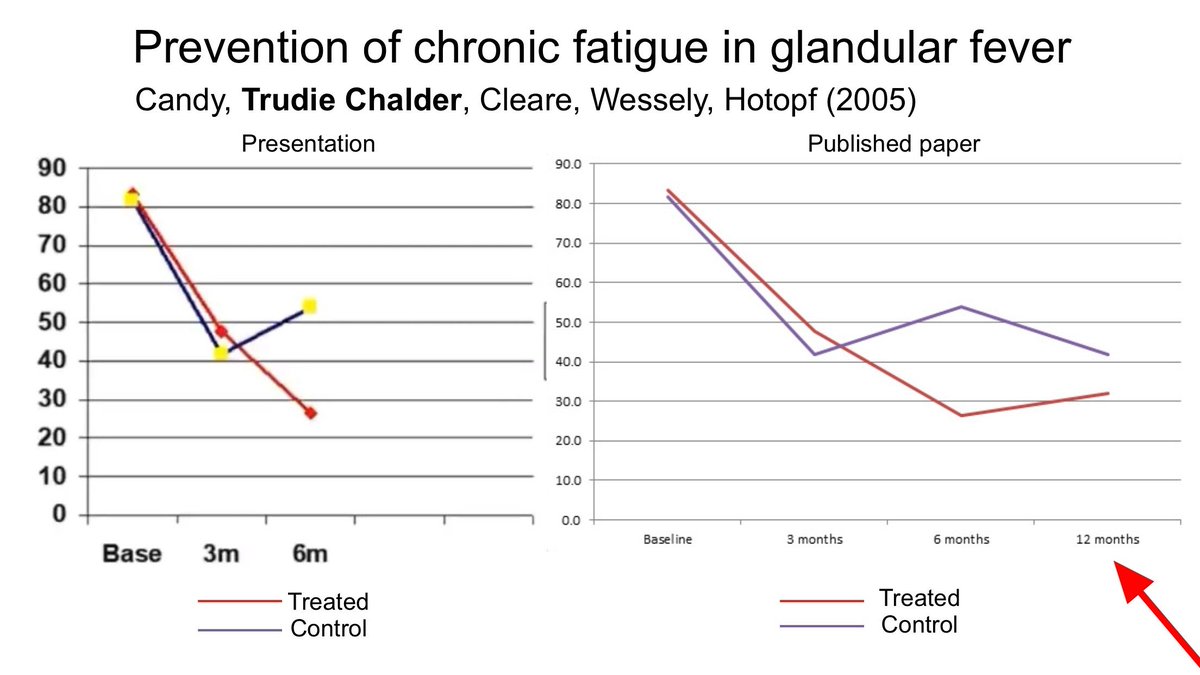
Thread 🧵
After an extensive 3 year review NICE were going to stop recommending Graded Exercise for ME/CFS, due to lack of evidence and possible harm. The day before it was due NICE decided to halt publication after medical bodies were refusing to endorse it.
After an extensive 3 year review NICE were going to stop recommending Graded Exercise for ME/CFS, due to lack of evidence and possible harm. The day before it was due NICE decided to halt publication after medical bodies were refusing to endorse it.
This thread of updated explainer videos (with clips from experts, MPs and patients) outlines some of the reasons why NICE we're going to drop Graded Exercise and the devastating impact it has had on patients over the last few decades.
The hallmark symptom of ME/CFS is: even minimal exertion can cause a flare in symptoms and a reduction in physical capability (a crash) that can last for days/weeks/months.
The 2007 guideline which included Graded Exercise "does not fit" with patient experience - Dr Muirhead
The 2007 guideline which included Graded Exercise "does not fit" with patient experience - Dr Muirhead
Multiple patient surveys (over 18000 pts) consistently report that Graded Exercise makes people with ME worse. Many are made significantly more disabled and some never recover. Graded Exercise has caused 'untold physical damage to thousands of people with ME' - Carol Monaghan MP.
NICE reviewed the evidence and found it to be 'low' or 'very low' quality. This included the 'definitive' £5M PACE trial which was debunked after a FOI request and has been described as "One of the biggest medical scandals of the 21st century" - Carol Monaghan MP
PACE had many problems but the biggest is that it was non-blinded and relied on self report data (questionnaires). 'No matter what the researchers say, no matter what journal has published it, no matter how people defend it. It's fundamentally flawed' - Prof Brian Hughes.
Similar trials of Graded Exercise in ME/CFS have the same design flaw - "so problems of bias, make more or less all the trials to date unsuitable as a basis for treatment recommendation.”
- Prof Edwards expert testimony to NICE explains in more detail.
mecfsresearchreview.me/2021/01/12/the…
- Prof Edwards expert testimony to NICE explains in more detail.
mecfsresearchreview.me/2021/01/12/the…
Patients are often dismissed, GPs have been taught patients are "frustrating", you can get into "arguments about treatment" & other investigations "stopped'. The patients have been right to point out that Graded Exercise is not valid and should not be used - Prof J Edwards
The impact of these treatments has been devastating. Patients that refuse Graded Exercise have been denied benefits and insurance claims, some are even threatened with being sectioned. And parents have been threatened with child protection proceedings.
George Monbiot described it as "one of the greatest medical scandals of this century" & "scientific and media establishment closed ranks around bad science, defending it from legitimate questioning and criticism."
Full interview
https://twitter.com/GeorgeMonbiot/status/1382258404215914498?s=19
Full interview
To help people with ME/CFS please sign this petition calling for NICE to publish the finalised ME/CFS guideline in its current form.
meaction.net/2021/08/19/sig…
meaction.net/2021/08/19/sig…
For clarity: The above quotes about GPs are from the training video. Quote from Prof Jonathan Edwards is
"the patient community has been right to point out that CBT and GET [Graded Exercise] are not validated treatments for ME/CFS and should not be used”
"the patient community has been right to point out that CBT and GET [Graded Exercise] are not validated treatments for ME/CFS and should not be used”
https://twitter.com/Healthy_Control/status/1428345089911296004?s=19
• • •
Missing some Tweet in this thread? You can try to
force a refresh











